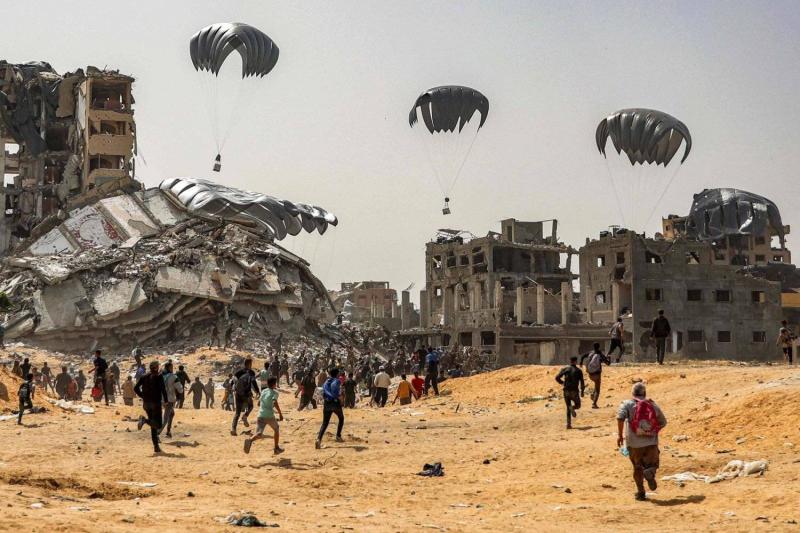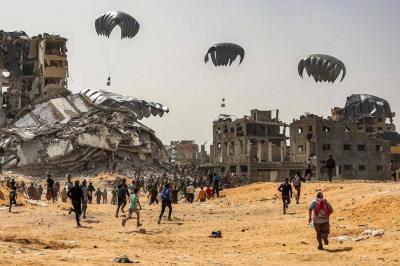The Gaza crisis remains bloody and devastating for over nine months, with intensive efforts made towards reaching a three-phase agreement for a continuous ceasefire, gradual exchange of hostages and prisoners, ample humanitarian aid, and reconstruction of the Gaza Strip. The United Nations Security Council adopted Resolution 2735, which is not ideal due to its repeated use of vague and open-ended phrases subject to various interpretations, and the lack of strong links between its three phases. Additionally, the resolution does not hold any accountability for the destruction that occurred or the subsequent failure to fulfill the commitments outlined, raising concerns—especially since the U.S. permanent representative to the UN stated, oddly, that the resolution is not binding during a previous Security Council meeting concerning Gaza that Washington abstained from voting in.
**Linking the Crisis Resolution to Core Issues:**
There are many doubts that any steps agreed upon under this peace proposal will be implemented faithfully. I share many of these concerns as a skeptic. I have previously asserted in my writings that resolving the current crisis in Gaza is linked to addressing the core issue of the Israeli occupation, which is the only way to end the cycle of violence. However, I believe that Security Council Resolution 2735 could be beneficial if complemented and implemented. What I find important in the first and second phases of implementing the resolution is the calls for an "immediate and complete ceasefire," a "total cessation of hostilities," and a "full withdrawal of Israeli forces," which have indeed been called for, albeit through non-committal phrases such as "by mutual agreement."
**Ensuring Demographic Stability:**
Another important issue, often overlooked, is that the resolution itself, adopted by the Security Council on June 10, affirms the Council's complete rejection of any attempts to effect demographic or territorial changes in the Gaza Strip, including any measures that reduce the area of the territory. These demographic and territorial assurances are crucial, especially in light of Israel's illegal establishment of security zones within Gaza's perimeter, its control over the Philadelphia Corridor, and the establishment of security passages that divide and tear apart the territory. Furthermore, the reiterated commitment of the Security Council through the mentioned resolution is significant as it reaffirms the Council's vision of a two-state solution, under which two democratic states (Israel and Palestine) coexist in peace within recognized and secure borders.
**The Role of the International Community:**
The international community and the Arab world must remember and be well aware that the Israeli occupation of Palestinian territories has been a prolonged de facto situation for almost eight decades now, particularly since 1967. Often, existing and uncontrolled situations develop into de facto realities. This has always been a painful experience in the Middle East. Thus, despite urgent and substantial military and humanitarian concerns in Gaza, it is crucial to ensure that the crisis there does not turn into another permanent de facto situation, whether violent or otherwise. I am deeply concerned that we are heading in a very dangerous direction, as Israel is forcibly seizing land and clearly separating the Gaza Strip from the West Bank, which together have long constituted the Palestinian state. This situation may become the new status quo, perhaps extending into reality, even if an agreement is reached between Hamas and Israel.
The political landscape between Israelis and Palestinians does not bode well for the ability to make substantive decisions, particularly regarding war and peace. The upcoming U.S. presidential elections in November 2024 pose another constraint on critical strategic decision-making processes, further skewing the already biased perspective. Irresponsible decisions will have long-term consequences for all of us.
**Learning from History:**
We must not allow events or circumstances, whatever they may be, to distract us from the core issues. Simultaneously, we should not ignore the existing illegitimate reality, even if it appears peaceful. Even if Hamas or Israel agree to the three-phase peace plan (with some potential modifications to clarify the plan), the international community must closely monitor and insist without hesitation on "not accepting any demographic or territorial changes in Gaza." Additionally, the international community must continue to assert that "the goal is a two-state solution: Israel and Palestine." Maintaining a clear focus and active oversight on these three points is vital to prevent the current situation from evolving into an illegitimate reality.
**Public, Mutual Commitments:**
It is important for both Israel and Hamas to publicly commit not only to the two-state solution but also to refrain from making any demographic or territorial changes in Gaza. The Security Council, alongside UN bodies and agencies such as the Economic and Social Council, the World Health Organization, the World Food Programme, UNRWA (United Nations Relief and Works Agency for Palestine Refugees), and the UN High Commissioner for Refugees, must address these issues and provide regular and transparent reports to the UN, the Security Council, and other relevant entities. These reports must be an integral part of the review process for implementing the resolution.
**Ambiguity and Doubt:**
Hamas welcomed Security Council Resolution 2735 and implicitly agreed to its three core points, but more clarity and detail about its commitment to the points of the resolution would be beneficial. Conversely, Israel has remained silent regarding the Security Council resolution, raising the level of ambiguity about its intentions; thus, an unmistakable declaration from Tel Aviv committing clearly to all points of the mentioned resolution is essential. It is worth noting that when the Oslo Accords were signed, Yasser Arafat, as the President of the Palestine Liberation Organization, recognized the State of Israel. Therefore, no further steps are required from Mahmoud Abbas "Abu Mazen." Israel similarly recognized the PLO as the sole legitimate representative of the Palestinians, making further assurances necessary. The strong opposition of the current Israeli government to the two-state solution should not prevent the Security Council, including the United States, from maintaining support for this core issue.
It is crucial to learn from the painful lessons of history, as the subjugation and occupation of peoples engender resentment and insecurity that no arsenal can halt. The disproportionate use of force and inequality in rights can exacerbate conflicts between peoples, extending beyond combatants or security forces, threatening civilians and societal stability. Furthermore, statements made by Israeli officials as well as their actions on the ground contradict and challenge the vision of a two-state solution, as they represent unlawful and prohibited demographic and territorial changes by the Security Council. Thus, such actions cannot and should not be overlooked. Resolution 2735 is not a mere list of standalone measures from which one can choose; it is a comprehensive mandate that must be adopted in its entirety and implemented faithfully. This encompasses any change in the Gaza Strip and the overarching goals of Palestinian-Israeli peace.
Finally, I hope we have all learned from the painful lessons of history and that we refrain from allowing the current situation to dictate perilous paths for our future.




